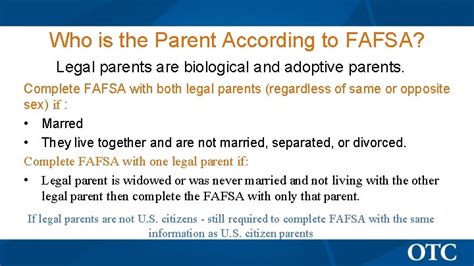For many legal residents, understanding the FAFSA can be a daunting task. However, it is crucial for students to complete the FAFSA accurately to determine their eligibility for federal financial aid. This article will delve into the FAFSA requirements, eligibility criteria, deadlines, and common questions specifically related to legal residents.

What is the FAFSA?
The Free Application for Federal Student Aid (FAFSA) is a form that allows students to apply for federal financial aid, including grants, loans, and work-study programs. The FAFSA collects information about the student’s financial need, including their income, assets, and family size. This information is used to calculate the student’s Expected Family Contribution (EFC), which determines their eligibility for financial aid.
FAFSA Eligibility for Legal Residents
Legal residents who meet the following criteria are eligible to complete the FAFSA:
- Have a valid Social Security number
- Have a Green Card (Permanent Resident Card) or other proof of legal residency
- Meet the residency requirements for the state they are living in
- Have a high school diploma or equivalent degree (GED) or are enrolled in a qualified educational program
Deadlines for Completing the FAFSA
The FAFSA is available on October 1st each year. The priority deadline for completing the FAFSA is typically February 15th, but some states have earlier deadlines. It is recommended to submit the FAFSA as early as possible to ensure maximum consideration for financial aid.
FAFSA Tips for Legal Residents
- Gather necessary documents: Collect your Social Security number, Green Card, tax returns, and any other relevant financial documents before starting the FAFSA.
- Use the IRS Data Retrieval Tool: This tool allows you to import your tax information directly into the FAFSA, saving time and reducing errors.
- Report all income and assets: Accurately report all sources of income and assets, including savings, investments, and any income from outside the United States.
- List all schools: Include all colleges or universities you are considering attending in the FAFSA. Each school will receive your information and determine your eligibility for financial aid.
Common Questions for Legal Residents
- Can I receive financial aid if I am not a U.S. citizen? Yes, legal residents who meet the eligibility criteria are eligible for federal financial aid, including grants and loans.
- What is the difference between a Green Card and a Permanent Resident Card? They are the same document. A Green Card is simply another name for a Permanent Resident Card.
- What if I have a temporary visa? Students with temporary visas, such as an F-1 or J-1 visa, are not eligible for federal financial aid unless they meet certain exceptions.
- What if I am undocumented? Undocumented students are not eligible for federal financial aid, but some states and colleges may offer alternative forms of financial assistance.
Benefits of Completing the FAFSA
Completing the FAFSA can provide numerous benefits, including:
- Access to financial aid: Grants, loans, and work-study programs can help students pay for college expenses.
- Lower cost of attendance: Financial aid can reduce the amount of money students and families need to borrow to cover college costs.
- Increased access to higher education: Financial aid can make higher education more affordable and accessible for legal residents.
Conclusion
Completing the FAFSA is an essential step for legal residents who plan to attend college. By understanding the requirements, eligibility criteria, and deadlines, students can ensure they receive the maximum amount of financial aid they are eligible for. Remember to gather necessary documents, use the IRS Data Retrieval Tool, report all income and assets, and list all schools on the FAFSA. If you have any questions or need assistance, reach out to your high school counselor or college admissions office.
